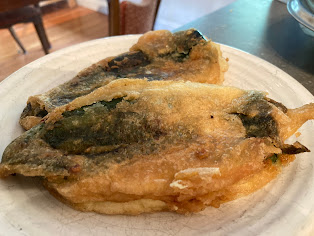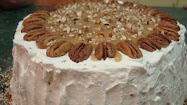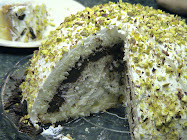 You might recognize puddul as a cognate of the English word "puddle"; waudikj means "whey." Prosaically translated these Low German words mean "puddle of whey." Now let me tell you what they really mean!
You might recognize puddul as a cognate of the English word "puddle"; waudikj means "whey." Prosaically translated these Low German words mean "puddle of whey." Now let me tell you what they really mean!I grew up on the edge of the small Mennonite village of Blumenort in rural Manitoba. Across the street from our house was an alfalfa field and on the far side of the field was a creek. A gentle slope rose from the creek and at the top of that ever so slight undulation was a hatchery. Before the hatchery was built, much before my time, the Mennonite farmers of the area operated a dairy co-operative at that location where they produced cheese and butter. The families in the co-operative, including my mother's family, delivered their milk to the factory in eight-gallon milk cans and returned home with them full of whey; nutrient-rich feed for their pigs to mix with their hash. But even after all the co-op farmers had collected their share of the whey, the cheese factory still did not know how to dispose of all the excess whey so it was left to drain out the back, down the little hill where it collected in small pools and eventually ran into the creek, the cloudy dribble of whey merging with the shallow flowing water of the creek. In the winter the whey froze long before it reached the creek, building up for a smelly, mucky spring when the swollen waters carried all the mess away. That was the 1940s, the Blumenort waudikjs puddul in all its putrid murky milkiness.

The cheese factory closed in the fifties in the wake of milk quotas, centralized milk processing dairies and modernization more generally. Yet the cheese factory in Blumenort is not entirely forgotten. Last summer, together with my aunt and mother, I sat looking out the front window of my mother's house watching the construction of a new housing development across the street. Mostly we commented on the ugliness of it all: the mess, the mud-packed street, the construction garbage, the loss of an expansive view. The alfalfa field had become a row of partially-constructed, generic-looking stuccoed houses. Sitting with my aunt and mother, nostalgia for the beauty of blooming alfalfa, the plank bridge I crossed on my way to and from school, the smell of poplar mulch in the copse at the edge of the field left me disgruntled and resentful towards the small-minded, money-hungry developers who cared little for the natural habitat of the birds, bugs, rabbits and mice that lived in that field and even less for my nostalgia. To add insult to the injury of suburbia invading my memories, the developers had hired a bulldozer to damn the creek in order to create a small pond backing the development. The creek as I had known it with its bullrushes and grass-covered banks where meadow larks sang Fritz, Fraunz, kjielkje supp [Fritz, Frank, noodle soup] and red winged black birds chirped and warbled had been transformed into a landscaped pond designed to add some suburban sophistication to the rather hickish little prairie town I grew up in. Eventually the pond will fill up with bullrushes, another generation of red winged black birds will build their nests, it's possible frogs will again croak long into the night. The generic row of houses will become a tree-lined street with people calling "home" the stucco houses fronted by meticulously mown grass and brightly colored flowers. Oakdale Drive will look much like the other pretty streets of Blumenort. But I? I would rather have an alfalfa field and a creek.

Like me, my aunt could see little beauty in the mucked up field across the street, pond included. Unlike me, however, my aunt is not prone to nostalgia, or perhaps it presents itself in her wry sense of humor. Her first objection to the pond: the standing water would only serve as a breeding ground for mosquitoes and heaven knows Manitoba does not need more mosquitoes! But more damning, my aunt remembers. Before the bulldozers dug the basements, dump trucks brought in back fill and building crews left their pink insulation wrappings to blow in the wind, even before I ran through the blooming alfalfa kite string in hand, there was a cheese factory! In her mind's eye, my aunt saw the dribble of collected whey, inhaled the smell of the melting mush of the spring's thaw. Matter-of-factly, wearing an almost straight face, slightly sarcastic, definitely sardonic, she pronounced her judgement on the pond: waudikjs puddul!
(photo credits: Douglas Fast)














































